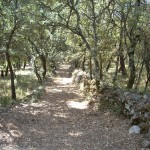She’s the patroness of women (especially “fallen” ones), poets, Ireland, and beer, among many, many other wonderful things. She had the ability to multiply butter and bacon. She was Chiara to St Patrick’s Francesco. As an abbess she had jurisdiction over a double monastery of men and women, a center of learning and culture that kept the perpetual light of knowledge burning through ages that would have been mighty dark otherwise. She just may have been the Christian face of the Celtic goddess of abundance and fire, a Spirit-driven Bridget-bridge between Eire’s Druidic past and its Catholic present. Today is her feast day, and what is not to celebrate–especially for this bacon-and-butter-eating, beer-drinking, poetical, oft-fallen Irishwoman–about St Brigid (Brigit, Bridget, Bride) of Kildare?
Brigid has something important to say, I think, to women and men in every age. Her virginity is not a cold denial of her sexuality, but a choice to live in relationship with God and to express as fully and autonomously as possible the gifts God has given her. Her power and authenticity come from God, not from her relationship with a man. In this way she points both to the Blessed Virgin (indeed, Brigid has long been known as “the Mary of the Gael”) and to that not-really-fallen other Mary of Magdala.
Brigid’s association with nature and fertility is certainly an inheritance from Ireland’s pagan past, baptized. Her foundation at Kildare (in Irish, cill dara, “church of the oak”) was built under an oak tree sacred to the Druids, next to a holy well to which women had long come asking for deliverance from barrenness, and the nuns under Brigid’s care tended the eternal flame the initiates of the goddess Bride had lit. Ages before today became her feast day in the Calendar of Saints, this day was celebrated by the Celts as Imbolc, the inauguration of the spring season of lambing and of cattle coming into milk. Imbolc means “in the belly,” a reference to the ewes’ bellies full to bursting with pregnancy. Of the many miracles attributed to St Brigid, the most notable are those associated with fertility and abundance and hospitality–increasing the yield of milk in times of drought, making butter churns overflow. My favorite, because of the way it epitomizes the triumph over dualism that Brigid symbolizes, is the legend that angels mystically transported her back in time and across space to serve as the wet nurse and foster mother for the Christ Child. Here is a great wonder indeed: A virgin suckling the Virgin’s Son!
As spring painfully thaws the frozen earth, I pray today for a reversion among Catholics to what Brigid stands for. May we recognize, as the anonymous author of the Book of Armagh did, the power of the partnership of women and men in ministry:
Between St Patrick and St Brigid, the columns of the Irish, there was so great a friendship of charity that they had but one heart and one mind. Through him and through her, Christ performed many miracles.
May we be reminded by the witness of Brigid, and of so many today, that women are not the “either/or” of virgin/whore, nun/mother, but the “all/and” of persons created in the image of God. May we celebrate the potential for fertility and creativity in every person, by God’s abundant grace. May we remember that this world can be a table of feasting as well as a vale of tears, and that Incarnation means we can make a prayer of every created gift. Brigid herself is said to have prayed (H/T to Frank Weathers, who pledges his fealty to Brigid today, too, for this):
I should like a great lake of beer for the King of Kings, and every drop a prayer:
I should like the angels of Heaven to be drinking it through time eternal . . .
May we keep the fire of learning and poetry and music aflame in the Faith, and the door of Brigid’s unstinting hospitality open.
Raise your glasses to the Mary of the Gaels, and join me in this invocation for her protection, from the collection of Celtic prayers known as the Carmina Gaedelica:
Radiant flame of gold, noble foster-mother of Christ,
Bride the daughter of Dugall the brown,
Son of Aodh, son of Art, son of Conn,
Son of Crearar, son of Cis, son of Carmac, son of Carruin.
Every day and every night
That I say the genealogy of Bride,
I shall not be killed, I shall not be harried,
I shall not be put in cell, I shall not be wounded,
Neither shall Christ leave me in forgetfulness.
No fire, no sun, no moon shall burn me,
No lake, no water, nor sea shall drown me,
No arrow of faery nor dart of fay shall wound me,
And I under the protection of my Holy Mary,
And my gentle foster-mother is my beloved Bride.












